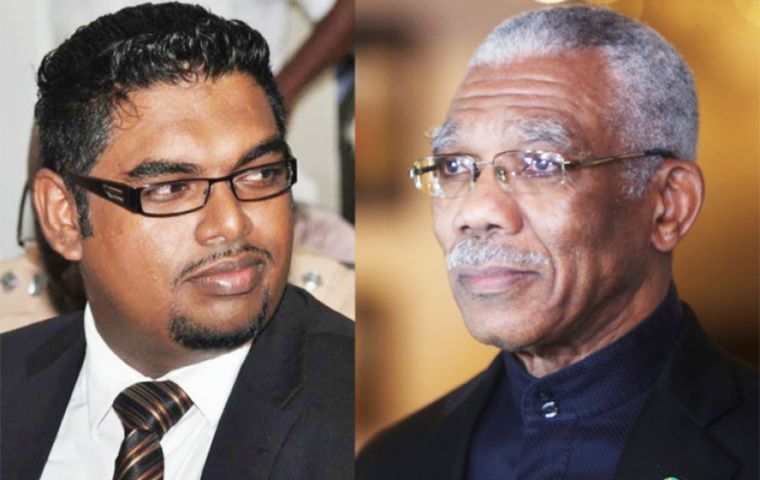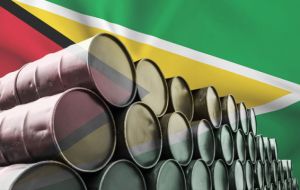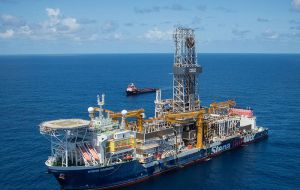MercoPress. South Atlantic News Agency
Crucial election in oil rich Guyana; economy forecasted to grow 85% this year, IMF
 Voting is likely to be tight between the ruling ANPU-AFC, led by President David Granger,(R) and the opposition People's Progressive Party (PPP) of Irfaan Ali
Voting is likely to be tight between the ruling ANPU-AFC, led by President David Granger,(R) and the opposition People's Progressive Party (PPP) of Irfaan Ali  With oil due to flow from vast offshore fields, IMF expects the economy to record the fastest growth worldwide this year: 85%.
With oil due to flow from vast offshore fields, IMF expects the economy to record the fastest growth worldwide this year: 85%.  Oil production is currently around 52,000 barrels per day but is expected to grow to 750,000 bpd from 2025
Oil production is currently around 52,000 barrels per day but is expected to grow to 750,000 bpd from 2025 Guyana goes to the polls this Monday in a pivotal election in one of South America's poorest nations, where a coming oil boom is set to reshape an ethnically-divided political landscape.
Voting is likely to be tight between the ruling Partnership for National Unity and Alliance for Change (ANPU-AFC), led by President David Granger, and the opposition People's Progressive Party (PPP) of Irfaan Ali. The parties shared a 33-32 split in the outgoing 65-seat National Assembly.
With oil due to flow from vast offshore fields following a huge discovery by ExxonMobil in 2016, the IMF expects the economy to record the fastest growth worldwide this year -- 85%.
Oil production is currently around 52,000 barrels per day but is expected to grow to 750,000 bpd from 2025.-
The 65 members of Guyana's National Assembly are elected using closed list proportional representation, with voters selecting parties rather than individual candidates.
The leader of the single party or coalition that emerges with the most seats becomes president.
But the parties “are not offering anything new so what is important is the oil,” said analyst Henry Jeffrey, a former professor of international relations at the University of Guyana.
“The result is that, because there is tremendous wealth about to come our way, it's a very important election,” he added.
But he said Guyana, located on the northeast tip of South America, is far from ready for the oil boom: key legislation has not been enacted, and the state lacks oil industry experts.
The expected surge in GDP has raised questions over how Guyanese will be able to manage the new wealth flowing into the country.
Voting is likely to run along ethnic lines, with Granger's ruling coalition getting its bedrock support from the Afro-Guyanese community while the PPP is backed by the Indo-Guyanese population.
“The problem in Guyana is an ethnic one and none of these parties is suggesting anything new,” Jeffrey added.
The government lost a confidence vote in December 2018 but contested the result and embarked on a series of court challenges to stay in power. Granger, a 74-year-old former army general, eventually called the March 2 election last September.
Both he and the 39-year-old Ali are vying for the youth vote with promises of free education, jobs, increased salaries and pensions as well cash grants for school-going children once oil revenues come on-stream.
ExxonMobil in January estimated total recoverable oil resources at 8 billion barrels.
Granger points to increases in salaries and pensions during his presidency, 4.7 percent economic growth in 2019, and says a get-tough policy on crime has reduced drug trafficking and murders as well as corruption.
Ali has campaigned on reducing taxes and improving social services.
British NGO Global Witness says Guyana lost out to the tune of US$ 55 billion through a poorly negotiated exploration contract with hard-bargaining ExxonMobil in 2016.
It said Guyana is at risk from rising sea levels and urgently needs money to build coastal defenses as well as for schools and hospitals, and called for the contract to be re-negotiated.
The former British colony -- bordered by Brazil, Venezuela and Suriname -- has a population of around 750,000, though lawmakers believe that one-third or more have emigrated to North America and the Caribbean.
The Elections Commission said final results would take several days as many of the more than 2,000 polling stations are in remote locations in territory dominated by forests, mountains and rivers.




Top Comments
Disclaimer & comment rulesCommenting for this story is now closed.
If you have a Facebook account, become a fan and comment on our Facebook Page!